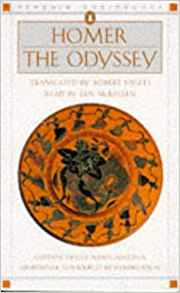 = Hurling down to the House of Death so
many sturdy souls
= Hurling down to the House of Death so
many sturdy souls
Reviewer: The Rebecca Review.com
Although the facts remain in doubt, Robert Fagles brings
a vigor to Homer’s 2,700-year-old story of the Trojan War.
This translation is read by Derek Jacobi and narrated by Maria
Tucci.
This story begins with an explanation by Maria Tucci which
tells of a time when a sea nymph married a mortal and all the
gods and goddesses attended the wedding. The “Goddess
Strife” threw a golden apple among the guests declaring it as
a prize for the most beautiful goddess on Olympus. Three
goddesses claimed the apple. Zeus then instructed Paris to make
the choice. Aphrodite offered him the love of Helen, the mortal
daughter of Zeus, therefore, he gave her the apple. The other
two goddesses were angered and went to plot the destruction of
Troy.
I have always been interested in why men would give up their
lives to save a woman. Is the woman worth saving or giving your
life for? This is not really answered in the Iliad.
If you are interested in Greek Mythology, this is a good
introduction to various gods and goddesses.
There are many descriptions of absolute cruelty and brutality
that if viewed onscreen would probably be a bit intense.
However, it is helpful to remember when this was written and how
men viewed war at this time. Have things changed? Are we more
civilized now? Perhaps we respect life and death more now and
while warriors saw their death as the ultimate sacrifice then,
perhaps warriors of today wish to not only defeat the enemy, but
also to preserve their lives and the lives of as many as
possible on the way to peace. It does seem that today, in war,
we try to find ways to not kill as many people. Here the
brutality explodes and there is a passionate energy to kill. It
is very primal.
Here in the scenes presented, it seems like death is the only
objective at times. The savage fighting hand to hand is almost
enjoyment for the gods. Woman are also seen as “war prizes.”
I was surprised by how lyrical the translation is. This is
not about war. It is also about he observation and there are
magnificent metaphors to be had. I was surprised by the sensual
images like when the dawn has red fingers and rises from bed or
the goddesses and food are described. While I can’t say I love
goat cheese, you will probably want to go have a barbecue.
Savory smoke swirling up towards the skies and an endless ocean
with salt green depths and churning surf add depth and color to
the story.
There is also humor to be had. Derek Jacobi’s voice is
adorably cute when he changes and reads the “goddess” parts.
I can’t explain why it is funny, just listen and you will see.
It is as if the goddesses are the ultimate in femininity. They
do present themselves as the most delicate of woman, while the
gods are ferocious and seem to represent the ultimate in male
behavior. Be that good or bad. Zeus is not especially interested
in saving life. His “sport” seems to be to watch humans in
battle. He commands the storm clouds and has a wife that nags
him. Sounds like any normal human relationship to me. And I
thought the gods would be above this. However, they seem to have
the same desires as humans, yet seem detached from the pain of
human suffering.
There is a huge difference in the Pope vs. Fagles
translation.
For example, in the Alexander Pope's translation it reads:
Achilles' wrath, to Greece the direful spring
Of woes unnumber'd, heavenly goddess, sing!
That wrath which hurl'd to Pluto's gloomy reign
The souls of might chiefs untimely slain;
Whose limbs unburied on the naked shore,
Devouring dogs and hungry vultures tore:
Since great Achilles and Atrides strove,
Such was the sovereign doom, and such the will of Jove!
Robert Fagles:
Rage -- Goddess, sing the rage of Peleus' son Achilles,
murderous, doomed, that cost the Achaeans countless losses,
hurling down to the House of Death so many sturdy souls,
great fighters' souls, but made their bodies carrion
feasts for the dogs and birds,
and the will of Zeus was moving toward its end.
Begin, Muse, when the two first broke and clashed,
Agamemnon lord of men and brilliant Achilles.
What a contrast! You can definitely appreciate the majesty of
the second version. It sings, it shouts beauty even in death. It
doesn’t try to fit into a “poem” format. It flows and
drives along like a story should. You wait for each word with
almost an anticipation in the Fagles version. In Alexander
Pope’s translation, you stop, start and are more concerned
with the rhyme than the story.
I’m pleased to know I picked the best translation to listen
to. If you are going to spend this much time (9 hours) then it
is well worth buying the “Robert Fagles” version.
A wonderful introduction to Homer and it sure beats reading
this all in bed for days. I’d rather listen to The Iliad than
pour over pages for hours. I think listening gives an added
benefit that reading alone can never hope to achieve.
I’m now completely “in love” with audiobooks! I can’t
wait to hear how the Odyssey is read. That has always been my
favorite because of the “sirens” and travels. Now, I won’t
be able to decide my favorite until I listen to the Odyssey
audiobook version.

The Odyssey (Classics on Cassette)
|